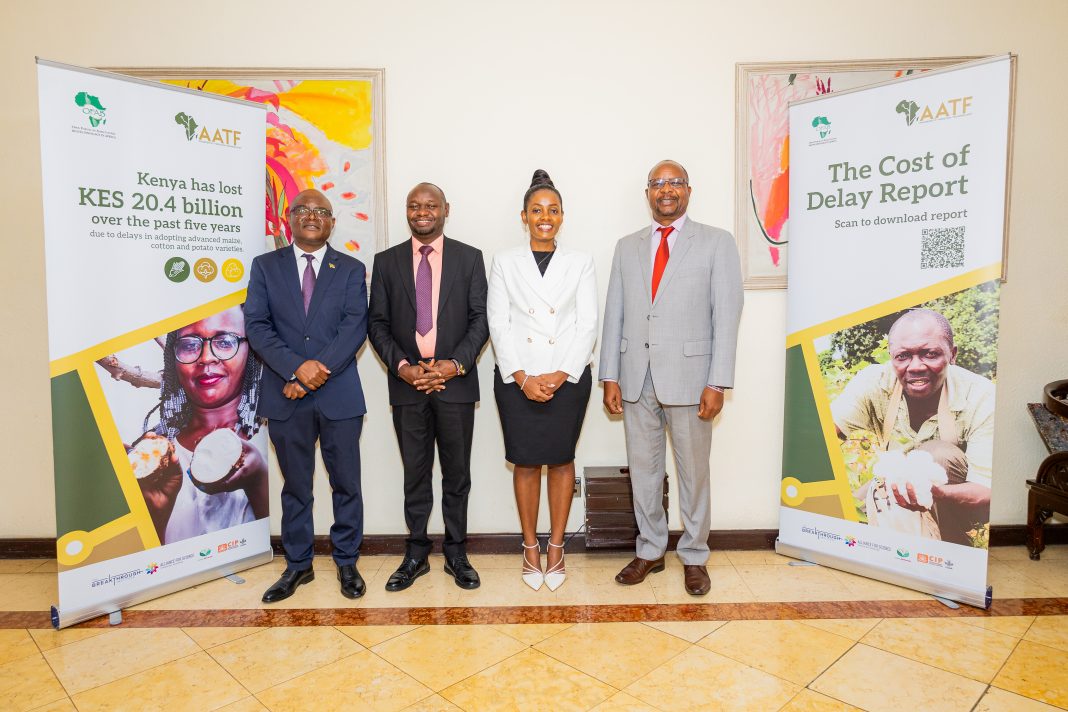By Dickens Okinyi
Delays in adopting advanced maize, cotton, and potato varieties have cost the country a staggering KSh 20.4 billion in just five years. The losses could have boosted food security, increased farmer incomes, and protected the environment.
This is according to a new report titled “The Cost of Delay,” developed by a consortium of leading agricultural and scientific institutions including the Breakthrough Institute, the Alliance for Science, the African Agricultural Technology Foundation (AATF), ISAAA, and the International Potato Center (CIP).
The report projects that if Kenya embraces these modern crop varieties now, the country could inject an estimated KSh 60.7 billion into its economy over the next 30 years.
Lead author Dr. Willy Daniel Kyalo says the evidence is clear — technology is not the enemy; delay is. “This report clearly shows that embracing advanced crop varieties in Kenya would generate substantial economic benefits,” he said. “By increasing yields, these varieties help protect our forests and biodiversity while reducing greenhouse gas emissions that drive climate change.”
According to the study, the losses stem from the government’s slow approval of three key crop varieties — insect-resistant (Bt) maize and cotton, and late blight-resistant potato. Developed through collaborations between African scientists and global research partners, these crops were designed to address the most devastating pests and diseases affecting Kenyan farmers. Yet, despite their proven safety and success in other countries, they remain tied up in regulatory delays and misinformation campaigns.
Bt maize varieties, for example, are naturally resistant to pests such as the stem borer and fall armyworm — two notorious destroyers of Kenya’s staple food. If Kenya had adopted the advanced maize earlier, farmers could have harvested an extra 194,000 tonnes of maize, roughly a quarter of the country’s 2022 maize imports. That shortfall has forced Kenya to rely on food aid, often imported from countries already benefiting from the same technologies Kenya has yet to approve.
“It’s ironic,” Dr. Kyalo noted. “We are importing food aid grown with technologies we have denied our own farmers.”
The report also found that delays in adopting Bt cotton and advanced potato varieties have deprived farmers of critical income opportunities. Cotton farmers could have produced an extra 650 tonnes of lint, offsetting about 12 percent of Kenya’s 2022 cotton imports. Meanwhile, advanced potatoes could bring KSh 21.2 billion in benefits to farmers and KSh 10.9 billion to consumers over the next three decades, solidifying food security for one of Kenya’s most consumed crops after maize.
However, the economic losses are not the only concern. Scientists warn that misinformation and fearmongering have done significant damage to Kenya’s agricultural progress.
“As Kenya grapples with ongoing food deficits, misinformation campaigns are actively harming science-based efforts to help farmers,” said Prof. Joel W. Ochieng, Secretary General of the Kenya University Biotechnology Consortium (KUBICO).
“Some media outlets, social media users, and even political leaders have spread irresponsible claims about advanced crops. We want to be clear — these varieties are safe, proven, and vital for our food security.”
The advanced maize and cotton varieties use a natural gene from Bacillus thuringiensis (Bt), a harmless soil bacterium long used in organic farming as a pest control agent. This gene allows the crops to resist destructive insects without affecting humans, animals, or beneficial insects. Contrary to popular myths, these crops are not herbicide-resistant or linked to glyphosate (Roundup) use. Their main purpose is to help farmers reduce dependence on expensive chemical pesticides, lower production costs, and protect their health.
Beyond the farm, adopting advanced crops could also help Kenya cut its greenhouse gas emissions by up to 0.7 percent — a small but significant step toward addressing climate change. By reducing the need for pesticides and minimizing land expansion for farming, these technologies preserve forests and biodiversity, ensuring a more sustainable agricultural future.
Dr. Emma Kovak, Senior Food and Agriculture Analyst at the Breakthrough Institute, urged policymakers to stop dragging their feet and prioritize the commercialization of these technologies.
“Kenya must accelerate approvals and increase funding for agricultural research,” she said. “We need to strengthen seed production systems and ensure that local farmers can access these improved varieties. Every year of delay means lost harvests, lost income, and lost opportunities.”
Kenya made progress in 2020 by approving Bt cotton, which protects against the devastating bollworm pest. Three Bt maize varieties are now awaiting Cabinet approval, while the advanced potato resistant to late blight disease — a common cause of massive crop losses — is undergoing final field trials.
According to Vitumbiko Chinoko, manager of AATF’s Open Forum on Agricultural Biotechnology (OFAB), these technologies are tailor-made for Kenyan farmers. “Seventy percent of our maize farmers and ninety-eight percent of our potato farmers are smallholders,” he said. “They face enormous challenges from pests and diseases. Advanced crop varieties give them safe, affordable, and effective tools to fight back.”
Chinoko emphasized that while advanced varieties are not a silver bullet, they are a crucial part of a broader agricultural solution. Combined with better agronomic practices, improved market access, and supportive policies, they could transform rural livelihoods and strengthen food security.
“We view these findings as an urgent call to action for the Kenyan government,” he said. “Kenya has the scientific capacity and safety regulations in place. What’s missing is political will.”
As the Cabinet prepares to make a final decision on the approval of Bt maize and late blight-resistant potatoes, experts warn that every passing season deepens Kenya’s food insecurity and economic losses.
“Every year of inaction costs us billions,” Prof. Ochieng cautioned. “But beyond the numbers, it costs Kenyan families their food, their income, and their hope for a better future.







